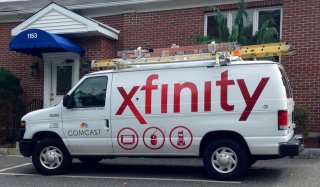Senators Call for Comcast to Open Home Wi-Fi Hotspots (As In the One in Your Home)
Comcast has opened up its Wi-Fi hotspots, the ones based in businesses and outdoor areas, for the general public during the coronavirus crisis. They have not done so, however, with the hot spots that are located on customers' home routers. Now, a trio of U.S. senators is saying that perhaps they should.
As we wrote about here at The National Interest last week, Comcast has opened up its Wi-Fi hotspots, the ones based in businesses and outdoor areas, for the general public during the coronavirus crisis. They have not done so, however, with the hot spots that are located on customers' home routers.
Now, a trio of U.S. senators is saying that perhaps they should. Three Democratic senators, including two who ran for president in the 2020 cycle, have written a letter to Comcast chairman and CEO Brian Roberts, asking the company to make that change.
In the letter, dated May 7, Sen. Ron Wyden of Oregon, Sen. Kamala Harris of California and Sen. Cory Booker of New Jersey, state that "we write to ask Comcast to open up millions of Comcast-operated public Wi-Fi networks to American children who lack internet access at home, helping to ensure that these children are not left behind during the COVID-19 epidemic as school classrooms move online across the country.”
The letter goes on to say that "Comcast has taken important steps to help Americans get connected during this global health emergency. But it can- and should- do more to help children in [Sen. Wyden's home state of] Oregon and across the country." The letter goes on to state that after Sen. Wyden asked Comcast to drop the paywall on residential Wi-Fi networks, he was told doing so could "create Wi-Fi congestion and could impact the speed for paying subscribers' Interest connections."
Sens. Harris and Booker both ran for president in the Democratic primaries, and both have since dropped out and endorsed former Vice President Joe Biden.
Comcast has not responded directly to the request. But when asked by the website Ars Technica, the company stated that its network has "performed exceedingly well at this new record level of traffic due to our substantial investment in our network and the herculean efforts of our front-line technicians and workers."
At the start of the coronavirus pandemic, Comcast took a series of steps, which included offering two months of free Internet for its low-income Internet Essentials customers and agreeing not to disconnect or charge late fees, in addition to opening the outdoor hot spots. Those efforts have been extended to June 30.
The question, raised by the senators, of how to serve low-income students without Internet access at home was subject of controversy last month, in Comcast's hometown of Philadelphia.
The Philadelphia School District drew fire in April when a district website offered guidance for how students without Wi-Fi at home could perform their schoolwork during distance learning protocols. The list included Comcast's Internet Essentials, as well as Verizon, and T-Mobile's free or low-cost options.
But it also suggested "parking lot," which was interpreted as the district asking students to sit in the parking lot outside of a school or library and use the building's Wi-Fi signal. Per local news site Billy Penn, which originally broke the story, the district later removed the "parking lot" option from the site and backed down from the assertion that students should do that. The district later announced plans to distribute hot spots to students who need them, although they’ve had to compete with other schools that are vying for a limited supply.
Stephen Silver, a technology writer for The National Interest, is a journalist, essayist, and film critic, who is also a contributor to Philly Voice, Philadelphia Weekly, the Jewish Telegraphic Agency, Living Life Fearless, Backstage magazine, Broad Street Review and Splice Today. The co-founder of the Philadelphia Film Critics Circle, Stephen lives in suburban Philadelphia with his wife and two sons.
Image: Flickr via Creative Commons License.

